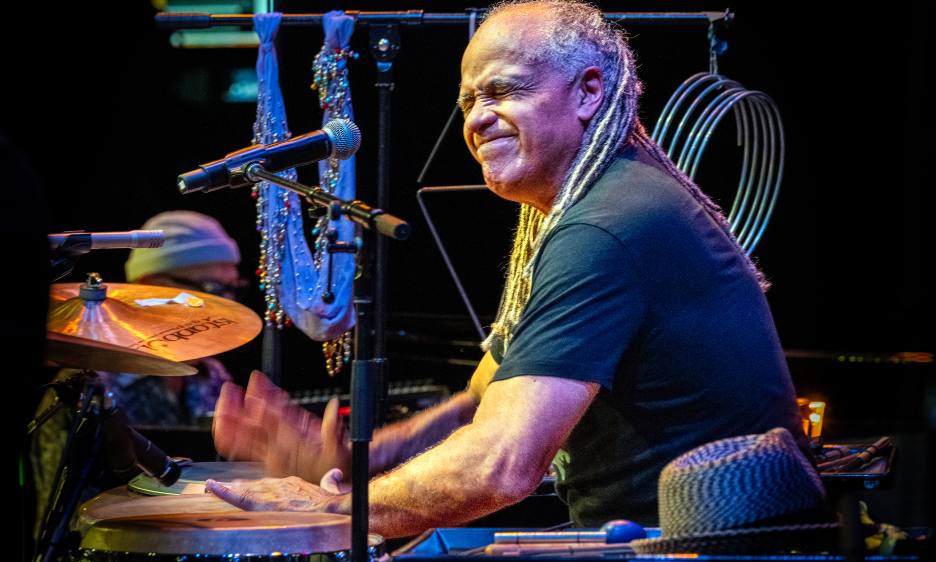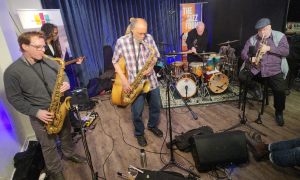Home » Jazz Articles » Live Review » Mino Cinélu at The Presidio Theatre
Mino Cinélu at The Presidio Theatre

Courtesy Steve Roby
Presidio Theatre
Mino 4 Miles
San Francisco, CA
September 6, 2025
The room begins with absence—no band, no chatter—just a white gauze curtain hanging like a flag with no country. A looped rhythm creeps in from the edges, dry and sandy, like shoes on stone. Then the words land—Miles Davis on change, on refusing the safe—projected large enough to read and short enough to sting. "If anybody wants to keep creating, they have to be about change."
Images of Miles flicker behind the text. Another line—"Don't fear mistakes because there are none"—and then the curtain drops hard. On the riser: Mino Cinelu, grinning, ready. Sticks and hands hit metal and skin—sharp, then round, then sharp again—an opening statement and a demand. The message is simple: movement or nothing.
"Mino 4 Miles" promises a tribute and then dodges it, swinging past it and circling it with purpose—four Miles pieces in a 90-minute set that keeps returning to Cinélu's own map. The number matters. Four, not more—enough to tip the hat, not enough to wear it. What follows is a guided detour through Cinélu's world: tribal pulse, city shuffle, soft pop sung like a vow, Afro-jazz twist and release. The Miles through-line is there and not there—ghost, outline, pressure.
The band is a thrown-together strike team—handpicked for this stage, this night. Tim Ries on saxophone, Michael Rodriguez on trumpet, John Beasley at the piano, Matt Penman on bass, Obed Calvaire on drums. No weak links. No passengers. Each one a driver. The rhythm section locks like a safe—Penman steady but not stiff, Calvaire loose but never vague. Beasley paints planes of harmony that shift underfoot—sometimes cool, sometimes jagged, always useful. Rodriguez offers clean tone and smart phrasing—no empty heat, no flab. Ries pushes air through reed with purpose, edges rough when needed, smooth when the line wants to glide. And Cinélu—center of gravity—switching from the sprawling percussion rig to electric guitar to voice, controlling texture and temperature like traffic lights—green, yellow, red, then green again.
"Across the Silk Road" takes the pre-show mood and makes it flesh. Ostinatos circle. Bell tones cut. The band leans into a modal drone that feels ancient and modern at once—simple materials, complex motion. The groove breathes, expands—no hurry. This is the thesis: travel, absorb, reframe. The audience leans in—heads nodding small, then bigger.
"Will O The Wisp" carries the first clear trace of Davis. The arrangement keeps space sacred. Rodriguez floats lines that sound like questions. Beasley spreads quiet chords like gauze. Calvaire brushes and taps, not to decorate but to shape the air. It's respectful without being reverent—good. Reverence kills momentum; this band wants momentum.
Then a left turn with "Summertime"—Cinélu strapped with electric guitar, voice up front, the band tucked behind him. The singing is direct. No melisma. No pleading. He phrases short—punch, release, punch—while the guitar outlines spare voicings, almost skeletal. The choice is bold because it resets the room's temperature; not everyone wants the reset. Some faces want the trumpet to lead, the sax to testify. Instead, a pop-soul reading that places song before showmanship. The bet mostly lands—clean, unfussy—but the dynamic dips and takes a minute to rebuild.
Midway through, a full exit—no announcement. The audience stays put, unsure—intermission or interlude? The house lights do not rise. On the screen, a short film: a wooden stick figure. Puppeteer Basil Twist enters with the two-foot marionette, Stick Man, and the small figure walks, bows, dances—delicate, then comic—until it tap-taps on a cymbal at Cinélu's kit. Cinélu returns, amused, watching his gear become a stage for a stage. The segment charms—unexpected, human, odd in the best way—but it slows the blood. Momentum pauses. The band must re-ignite.
They do. "In A Silent Way" arrives like a door opening onto cool air. Beasley builds a slow-bloom bed—sustained tones, almost organ-like. Penman sets the two-note spine. Calvaire murmurs on cymbals, swells under the surface. Rodriguez elongates the melody until time blurs. Ries answers with a reed whisper that turns to a cry. The effect is hypnotic—finally the set breathes Miles-level oxygen—meditative but not sleepy, and the room goes still. This is the high point for the Davis faithful—no contest.
"So What" snaps the trance and throws elbows. Bass states the two-chord truth. Drums square the corners. The solos come in waves—trumpet poised, sax more angular, piano cutting shapes—while Cinélu adds small percussive pricks around the kit that act like sparks. The piece doesn't try to out-cool the original—wise move—but it does find bite. If anything holds it back, it's the clock; the band keeps it tight when it could have stretched—five more minutes of risk would have paid.
Elsewhere, Cinélu's catalog carries weight. "Urban Stroll" moves like its title—forward, head up, scanning for cross-currents. "Why Not" is a shrug turned into a dare. "Nostalgie"—a Julio Iglesias tune reframed—puts vocal warmth at the center and tests the room's appetite for softness; it works because the arrangement refuses sugar. Cinélu's voice is unadorned, human—no studio gloss to hide behind—so the band builds a frame of light touch and negative space. "Le Jour Se Leve" and "Across the Silk Road" bookend the global thread—not tourism, but craft.
Stagecraft matters tonight. One hundred candles along the lip of the stage—Cinélu's nod to the coming Davis centennial. The glow is ritual, not gimmick. The visuals, the quotes, the puppet—these things aim to place the music in a line of thought: change is rule, play is serious work, risk is the only way. Sometimes the signals crowd the signal; sometimes the show talks when the band could speak louder. But the intent is honest—celebration through action. "Little Planet" closes the main set with lift. Percussion slashes, then dances; the front line locks hooks into a five-minute burst that feels like a sprint after a long run. Standing ovation—earned. The encore, "Confians," comes fast. Cinélu calls for voices from the seats. People answer—not all, but enough. Call. Response. Another ovation—louder, longer, the group bowing as a unit.
Strengths: a leader who curates motion, players who listen hard, repertoire that refuses to sit still. The band understands silence and density and how to pivot between them; the grooves have body; the solos think before they shout. Weaknesses: pacing hiccups—the unannounced mid-set exit plus the extended visual interlude knock the engine out of gear; the "4 Miles" promise blurs expectations—some came for a wall of Davis and got a window instead. Yet the night holds—because the playing holds—because the point is made and remade: create or calcify.
So no museum here—no wax figure of Miles posed under a borrowed light. Instead, a drummer-griot using four Davis signposts to justify a broader road, a road that runs from North Africa to New York, from Weather Report to Kind of Blue, from a tap-dancing marionette to whispered trumpet lines that slice open silence and let the night breathe. Change or nothing—said at the top, proved by the end—again and again and again.
Setlist
"Across the Silk Road," "Will O The Wisp," "Le Jour Se Leve," "Summertime," "In A Silent Way," "So What," "Urban Stroll," "Why Not," "Nostalgie," "Little Planet." Encore: "Confians."Tags
Live Review
Mino Cinelu
Steven Roby
United States
California
san francisco
Miles Davis
Tim Ries
Michael Rodriguez
John Beasley
Matt Penman
Obed Calvaire
PREVIOUS / NEXT
Mino Cinelu Concerts
Jul
9
Thu
Support All About Jazz
 All About Jazz has been a pillar of jazz since 1995, championing it as an art form and, more importantly, supporting the musicians who make it. Our enduring commitment has made "AAJ" one of the most culturally important websites of its kind, read by hundreds of thousands of fans, musicians and industry figures every month.
All About Jazz has been a pillar of jazz since 1995, championing it as an art form and, more importantly, supporting the musicians who make it. Our enduring commitment has made "AAJ" one of the most culturally important websites of its kind, read by hundreds of thousands of fans, musicians and industry figures every month.



























